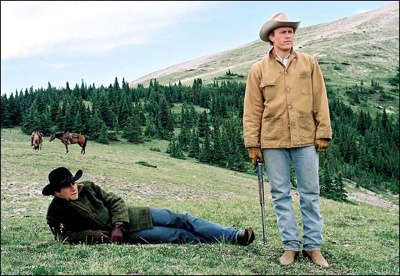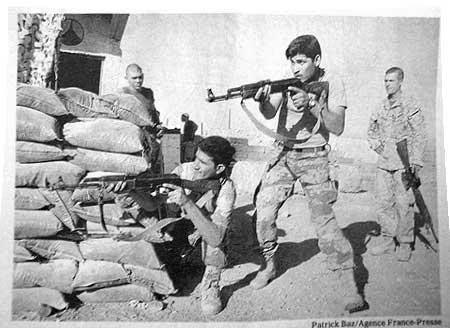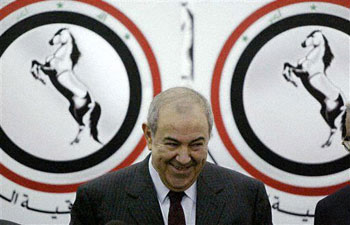Notes
The "Brokeback Effect"
(substantially revised 12/9/05 10:08 pm PST)

(click on the image for the big country-size view)
On one level, this image from the new film “Brokeback Mountain” fronting this morning’s NYT Arts Section is vintage “Marlboro Man.” The clever hook to this movie, however (which I’m convinced must also affect the way one looks at this picture), is how the meaning shifts when you realize these guys are lovers.
I think the closest The BAG comes to looking at this effect is in considering the effect of the text on a magazine cover, or a caption on a news photo. It almost goes without saying that context has everything to do with how we process the picture.
You can fault me for stereotyping or sexual bias, but I’ll tell you some of the ways I’m diverted once aware of the movie plot line.
If these were straight guys, I would be more interested in what they were looking at or where they were going. Knowing they’re lovers, however, I’m more inclined to wonder what these poses suggest about their roles in the relationship, or how they are getting along.
Knowing these guys are gay also gives me a different sense about the landscape. If these were two straight guys, I’d be more inclined to think they were traveling. Otherwise, I might be tempted to think that this is home.
On another dimension (because everything these days seems to revolve around war), I was interested in this segment of The Times review:
America’s squeaky closet doors may have swung open far enough for a gay rodeo circuit to flourish. But let’s not kid ourselves. In large segments of American society, especially in sports and the military, those doors remain sealed. The murder of Matthew Shepard, after all, took place in “Brokeback” territory.
Another recent film, “Jarhead” … suggests how any kind of male behavior perceived as soft and feminine within certain closed male environments triggers abuse and violence and how that repression of sexual energy is directly channeled into warfare.
Although the quote gets overly psychoanalytic toward the end, it highlights the tendency for American men to overcompensate rather than appear soft. If you take out the word “soft” and substitute the word “weak,” how much might that account, for example, for why Bush immediately put America on a war footing following 9/11?
(image: Kimberly French/Focus Features. December 9, 2005. The New York Times/Weekend Arts. p. B1)


Reactions
Comments Powered by Disqus